Harlan Ellison is one of the most influential figures in science fiction. He wrote hundreds upon hundred of short stories, screenplays, comics, and more, including the acclaimed Star Trek episode “The City on the Edge of Forever,” and won numerous awards during his life. He was also volatile and controversial, as much of a personality as any of his fictional characters, and his behavior was often appalling.
And in 1971, he fought the Justice League.
I’ve read literally thousands of comics, so when I say that Justice League of America #89 (May 1971) by Mike Friedrich and Dick Dillon is one of the weirdest I’ve ever read, that’s saying something. And when I dug into the background of this comic, it got even weirder. Let’s take a look!
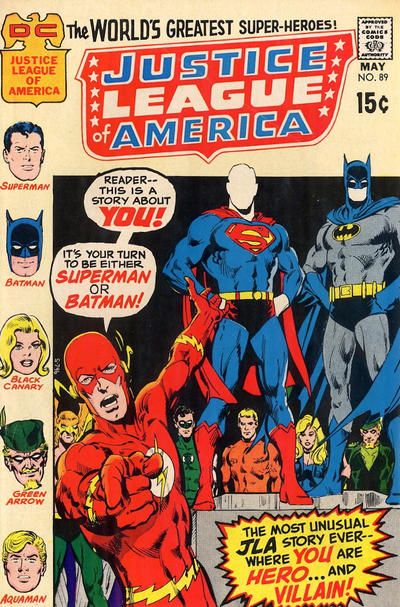
Right off the bat, things are strange, as the Flash hollers at the reader that it’s their (our?) turn to be Superman or Batman, because this story is about us! SPOILER: This is not true unless you are Harlan Ellison. THIS COMIC IS WEIRD.
The story proper begins with a Justice League meeting disbanding and the members dispersing to go about their civilian lives, which is abruptly interrupted by…Mike Friedrich, the writer of this comic:

Now, in the late ’60s and through the ’70s, it actually wasn’t uncommon for both DC and Marvel comics to feature creators as characters, often in a wackily self-deprecating way. There’s a whole Justice League arc where our heroes get stranded on “Earth-Prime,” AKA our world, where they are famous comic book characters, and they need the help of the staff at DC to get home. It’s…embarrassingly self-indulgent, but it was a familiar trope.
This, though? The writer staring into your eyes and telling you in ludicrously purple prose that he had to write this story? That’s new, and honestly kind of unsettling.
Enter Black Canary…and “Harlequin Ellis,” who is extremely obviously meant to be Harlan Ellison. In fact, Ellison had already sort of used the name Harlequin for himself in his famous short story “‘Repent, Harlequin!’ Said the Ticktockman” in which the titular Harlequin can be interpreted as an autobiographical figure. This is one of many Easter eggs referencing Ellison’s work that are sprinkled throughout the issue.
Anyway, “Harlequin” is immediately positioned the same way he will be throughout the story: as simultaneously conspicuously cool in a sunglasses-wearing, jet-setting kind of way, and also as a total douchebag.
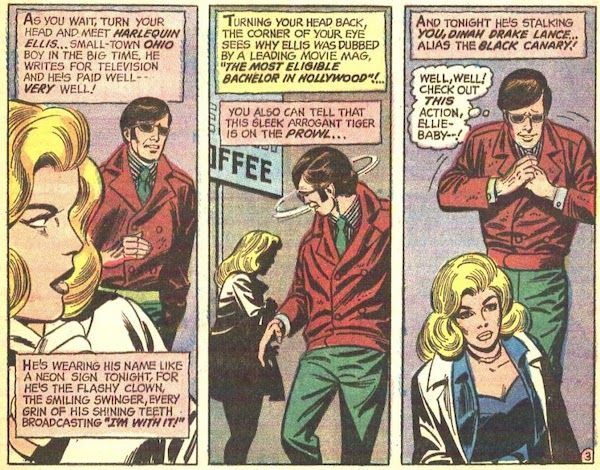
Harlequin talks Black Canary into getting a cup of coffee and she tells him that she’s still grieving her dead husband, Larry Lance. Harlequin understands, he says, because “three times have I lost a wife.” If he meant he’d been widowed three times, I’d be thinking this guy is definitely a serial killer, but based on Ellison’s real life he’s referring to the first three of his four divorces, which is hilarious. “Yeah, your husband’s violent death is exactly like three women dumping me, one after only seven weeks.” What a guy!
But Green Arrow has arrived, and he’s not pleased to see another man making time with his lady. He threatens to beat Harlequin up and Black Canary begs him not to, apparently forgetting that she has a black belt in judo and could stop this. It’s all very sexist and extremely tiresome.
Harlequin storms home, where he sits down at his typewriter and bursts into tears. Suddenly, Green Arrow and Black Canary are teleported to Mexico!
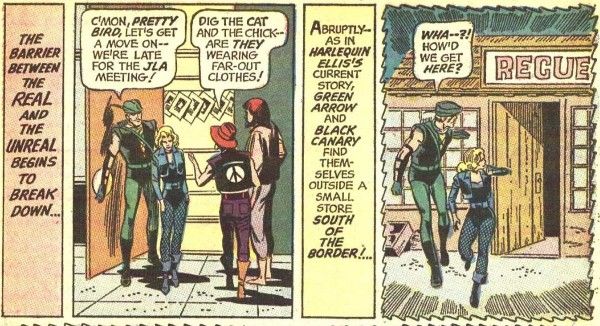
It’s unclear why the Mexico bit is in here at all, because the next thing we see is Harlequin imagining himself as Superman — and suddenly he is Superman! He flies down and scoops up a bewildered and very much not in Mexico Black Canary, who asks him where the League is.
Why, they’re…trapped in a cave by a giant cyborg while Aquaman dies from lack of water, of course:
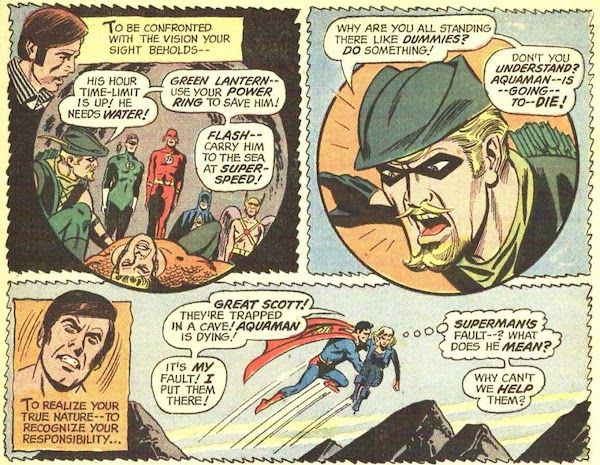
Harlequinn-Superman begrudgingly fights the cyborg, but it’s too late — Aquaman is dead! Shocked and despairing, Harlan tries to explain to Black Canary that he only killed her friend because he loves her so much from telling her about his three divorces for five minutes, but the dream suddenly dissolves, leaving Green Arrow and Black Canary thoroughly confused (but Aquaman presumably fine, elsewhere).
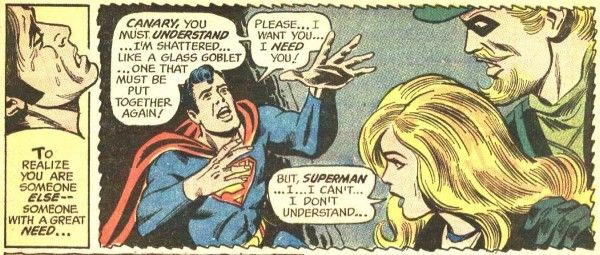
Harlequin, however, has not learned his lesson. He storms off to a nightclub, “throb[bing] with the pain-fire of rejected love.” Woof. This time, he imagines himself as Batman, with Green Arrow and Black Canary threatened by what the story calls a minotaur but is clearly a centaur with bonus horns:
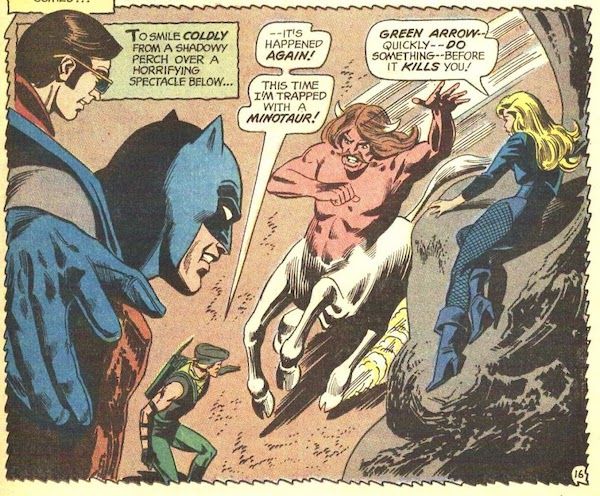
Green Arrow is injured by the minocentaur, but it’s not until Black Canary imperils herself that Harlequin bothers to help, saving them both and revealing his true identity:
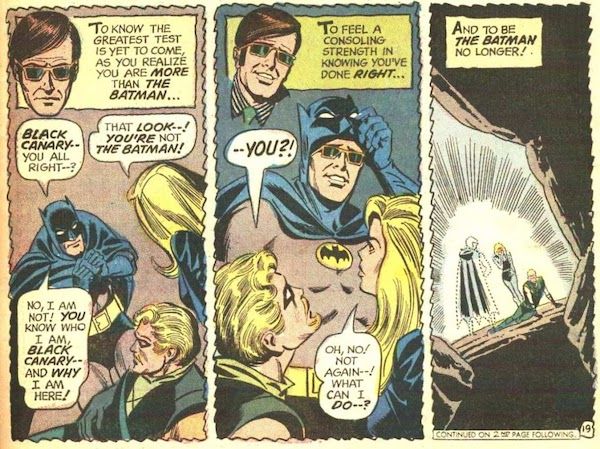
When this dream dissolves, Green Arrow’s injury remains. Fed up, Black Canary goes to confront Harlequin. Somehow she knows exactly how to find him, presumably by following the sounds of the Who cover band:
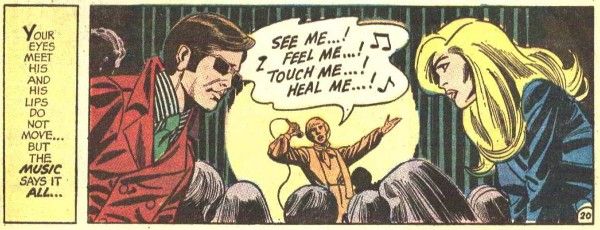
Black Canary tells Harlequin that he needs to grow up, but if he needs help, he can come to her. Dinah, honey, that’s very sweet of you, but please get a restraining order against this dude. And maybe break up with Green Arrow too?
Anyway, they part as friends, Harlequin walks off into the night, Black Canary rejoins Green Arrow…and the story ends with the weirdest final panel I have ever seen in a comic:
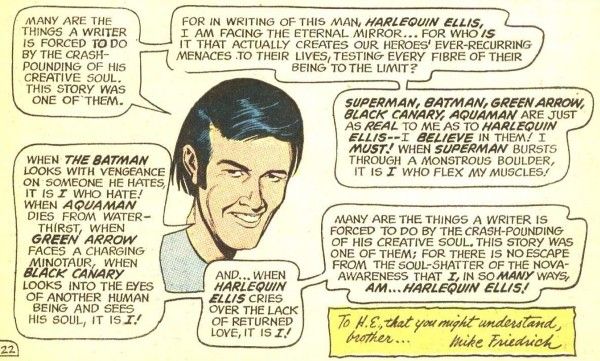
You see, reader, you are Superman and Batman and Black Canary, but also Harlequin Ellis, but also Mike Friedrich is the Justice League and Harlequin Ellis, so I guess you are also Mike Friedrich? And also Harlequin Ellis is Harlan Ellison. I’m not sure I want to be the walking embodiment of toxic masculinity as well as the blatant hero worship of said toxicity, but I guess I don’t have a choice!
But it’s that plaintive dedication that really piqued my curiosity: “To H.E., that you might understand, brother…” Dedications are incredibly rare in comics — I can think of maybe two others off the top of my head. I assumed it meant that Friedrich and Ellison were friends, but it was unusual enough that I googled it.
Turns out, they were barely acquaintances! They had met once, at a convention four years ago when Friedrich was 18 and had just started writing for DC, and Ellison had totally dismissed him. Meaning that this whole issue is actually just extremely bizarre fanmail.
And it was mail. According to this impressively comprehensive blog post from Attack of the 50 Year Old Comic Books, to which I am deeply indebted for this whole article, Friedrich attempted to send Ellison a copy of the script, but he was short on postage so Ellison sent it back rather than pay the difference, which is hilarious. Friedrich persevered with a few more stamps, and, according to Friedrich, Ellison finally read it, loved it, and became his bestest friend forever, which was the whole point of writing the story in the first place. In fact, Ellison liked it so much he asked to have Harlequin’s name changed to “Harlan Ellison”! (Editor Julius Schwartz wisely demurred.)
I am just boggled over this. Like, this appears to have been Friedrich’s plan:
- Get an A-list gig like the Justice League at the tender age of 21.
- Use it to write about my favorite author meeting the League, except he’s portrayed as an immature, murderous narcissist.
- Conclude with a breathlessly pretentious monologue delivered directly by me and an uncomfortably intimate dedication to someone I don’t even know.
- Mail to said favorite author.
- Now we are best friends, hooray!
And it worked! Do you think his next step was sending it to Roger Daltrey? Is that why the Tommy lyrics are in there?
This issue is truly a standalone — the events in it are never mentioned again, “Harlequin Ellis” never returns (though Harlan Ellison would coincidentally plot not one but two Marvel comics in the exact same month this JLA issue was published, The Avengers #88 and The Incredible Hulk #140), and I’ve never encountered another comic that does anything remotely like this, which is probably for the best. But hey, it’s memorable!
In conclusion, I must echo Mike Friedrich when I say that “many are the things a writer is forced to do by the crash-pounding of his creative soul!” My creative soul forced me to tell you about this comic, because it is bonkers. You’re welcome.








